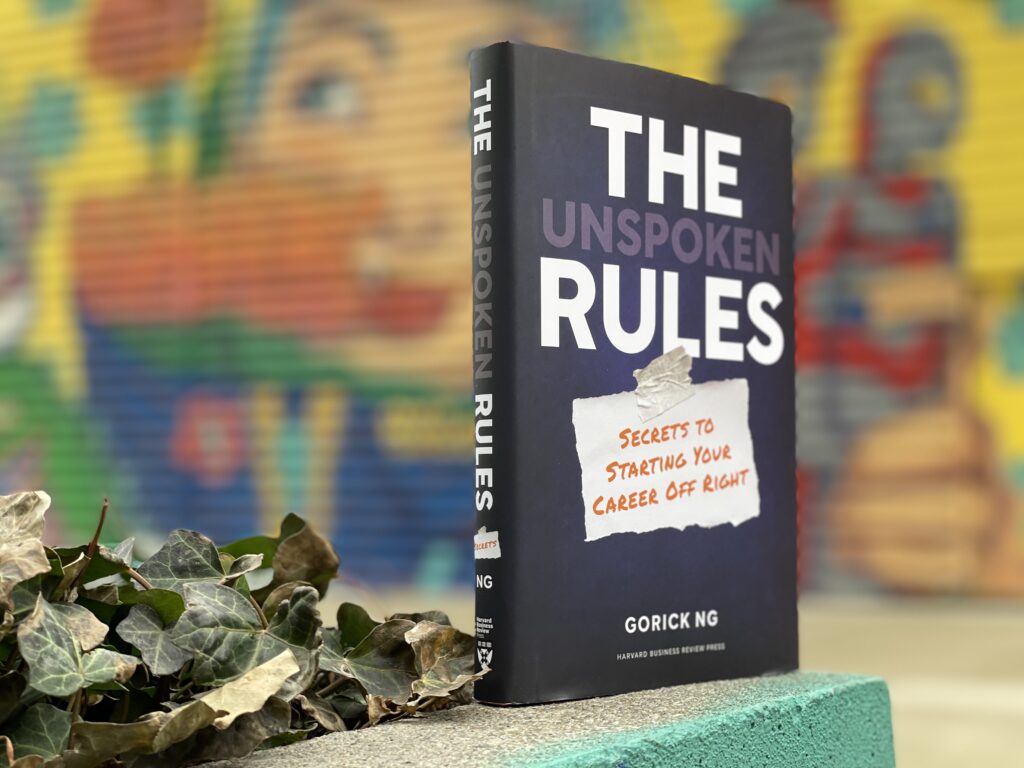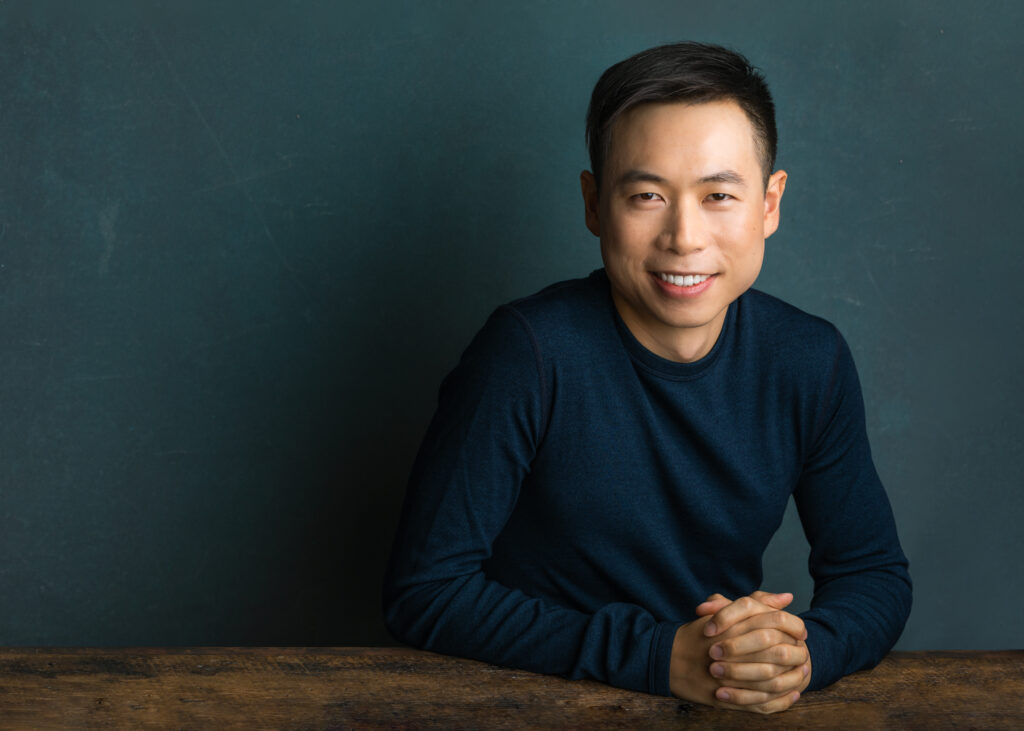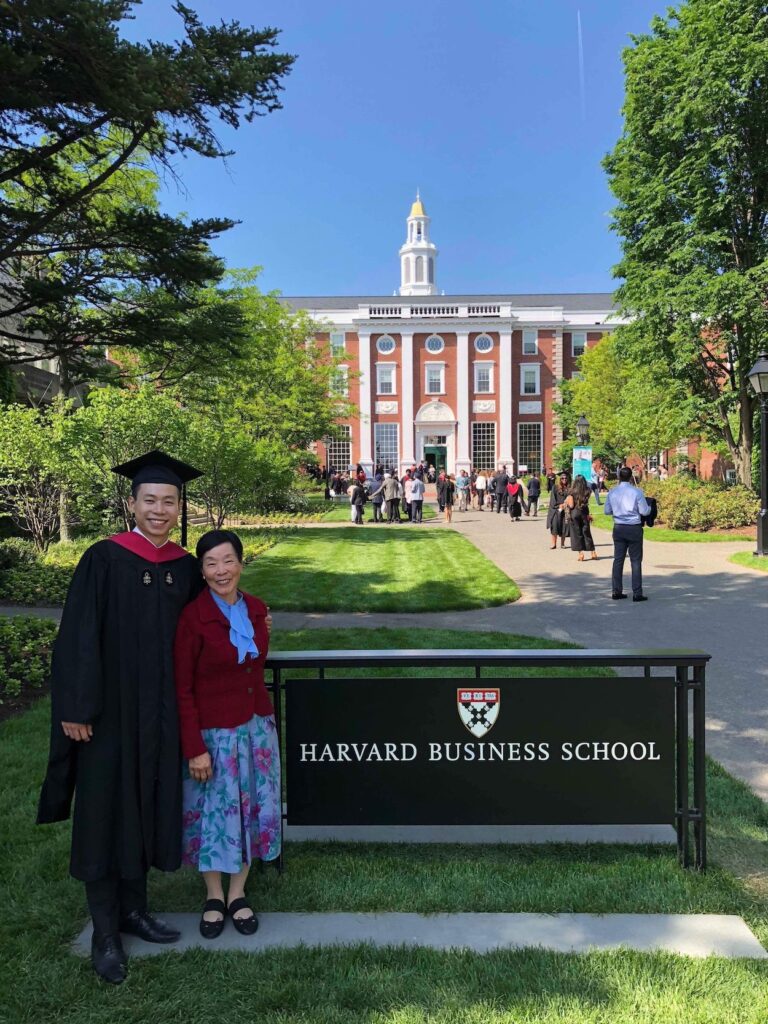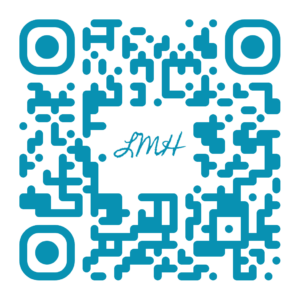
Today, I continue my ongoing series of conversations with published authors as I’m joined by Gorick Ng, author of the new book The Unspoken Rules: Secrets to Starting Your Career Off Right. Newly available from Harvard Business Review Press, Gorick’s Wall Street Journal Bestseller is the perfect gift for any career-oriented person in your life. I feel I must admit my bias upfront here! Gorick is not only a gifted author and communicator – he was my son Eric’s good friend in college. I’ve watched Gorick’s career take off over the last few years and couldn’t be happier to help spread the word about his first (but definitely not last!) book. The Unspoken Rules is the book I’ll be giving any and all graduates and young adults in my life. But don’t be mistaken: this book is for anyone who hopes to excel in life and achieve their goals, aspirations, and dreams. I hope you enjoy getting to know Gorick and the rules! LMH

Gorick, congratulations on the launch of The Unspoken Rules: Secrets to Starting Your Career Off Right. Is it ok for me to admit that I feel sort of like a proud aunt? Please begin by briefly introducing yourself to our readers.
I’m the son of a working-class single mother, a first-generation college and MBA graduate at Harvard, and a recovering investment banker and management consultant. Most importantly, I’m the college roommate of your son and my good friend, Eric Hendey. So, the aunt title could not be more fitting. I’m just flattered to hear that you’re a proud aunt!
More specific to my book, I spent the last five years asking over 500 professionals across geographies, industries, and job types three questions:
1. What are the most common mistakes people make at work?
2. What would you do differently if you could redo the first years of your career?
3. What separates top performers from mediocre ones?
And I distilled everything I learned into a tactical guide on how to navigate the workplace, from how to prepare for your first day, all the way through to how to get promoted, even if you’re working in what could seem like a dead-end job.
What is your main message for this book? How did you conceive of this particular formula to codify your thoughts on this topic?
My book’s “north star” is a framework that I call the Three Cs, which stands for competence, commitment, and compatibility. The instant you step into the workplace is the instant your managers and coworkers start asking themselves three questions: “Can you do the job well?” (Are you competent?) “Are you excited to be here?” (Are you committed?) and “Do you get along with us?” (Are you compatible?). The key to building trust and unlocking opportunity is to convince those around you to answer “yes!” to all three questions, all the time. My book then goes on to unpack what it looks like and sounds like to project competence, signal commitment, and establish compatibility at every turn, from meetings to emails to feedback sessions.
As simple as this framework is, it didn’t become obvious until the last year of this five-year-long journey. In fact, I was just scrolling through the folder where I’ve kept all of my drafts—all 466 files in total. This Three Cs framework didn’t emerge until the 315th file, or 68% of the way through. It was a stressful process. I was writing and rewriting everyday—and found myself constantly struggling to answer the seemingly simple question, so… what’s the big idea?
When I finally found an answer, I was both relieved and frustrated. I was relieved because I could finally summarize my book in a single—albeit run-on—sentence. I was frustrated because I kept wondering if I really needed 315 files and four years of my life to arrive at this point. To keep myself sane, I tell myself that all of these drafts really were necessary—and that I couldn’t have taken a shortcut. And I do believe it: as arduous as this combining and recombining process was, each draft brought me closer to being able to articulate my ideas more clearly and concisely.

In your engaging preface, you share some of the context for your book by providing a look into your personal history, including your relationship with your own mother. How do you think where you came from specially equips you to take on this important topic with a unique perspective?
Being an outsider to the white-collar world was a disadvantage that became an advantage. It began as a disadvantage because I had to learn all of these cultural norms through trial and error—something many of my peers didn’t have to do because they had parents coaching them over the dinner table since early childhood.
But I say that this disadvantage became an advantage because, as an outsider, I couldn’t have fallen victim of what psychologists call the “curse of knowledge” or the “curse of expertise.” The idea behind this so-called “curse” is that the more you know about something, the more you consider common sense, and the less able to you are to explain basic concepts to outsiders. Anyone who’s taken a class with a brilliant professor who can’t teach will have experienced this: this professor may be able to speak the language of, say, advanced quantum mechanics, but can’t teach physics 101. The workplace is similar: the longer someone breathes the air and drinks the water of the world of work, the less able they are to explain its cultural norms.
I’d also like to think that my research methodology helped. I spoke to over 500 professionals—and distilled everything they told me to their lowest common denominator. I asked managers to rant to me about the people they manage and asked recent grads and employees who felt stuck to rant to me about their managers—and, again, distilled everything I heard down to their essence. This meant that no piece of advice came from me exclusively; it came from a village. This also meant that no piece of advice is framed as a “you must do this.” Instead, I made sure to frame everything as “here’s a framework for navigating this unfamiliar situation; here’s an example of how someone in your shoes applied this framework; here are the obstacles that they and others have encountered; and here are some talking points, checklists, and fill-in-the-blanks exercises for you to apply your learning tomorrow.” As a result, I’d like to think that reading The Unspoken Rules feels less like listening to a lecture and more like hearing from a panel of older siblings who’ve all been in your shoes before.
Which of the “rules” is your favorite? With which “rule” do you personally find the greatest struggle?
It’s hard to pick a favorite child, but I’d like to think that “See the Big Picture” is a rule that’s especially relevant right now, no matter where you find yourself.
In the workplace, this rule is all about knowing how your role fits in with the team, how your team fits in your department, how your department fits in with your organization, and how your organization fits in with the broader industry and world (and, of course, how every piece of work you do fits in with this “big picture”). It’s all about taking a step back from the minutiae of the day to day and reminding yourself of what’s happening around you and what you’re trying to accomplish. This “rule” may feel like common sense, but it really isn’t—not if you’ve spent the last 16-plus years of your life checking off requirements and memorizing formulas.
This is a habit that is just as applicable beyond the workplace, too: students could be asking themselves, where is the world headed—and how might this all inform what I study and what I plan to pursue as a career? Mid-career professionals could be asking themselves, how is my industry changing—and what should I be doing to future-proof my company and my career? Thosewho were unemployed or looking to switch careers could be asking themselves, who is growing like crazy—and therefore hiring like crazy—and what can I bring that’d help this organization achieve its goals?
I’d say “Think Multiple Steps Ahead” is the rule I struggle with most, but in the opposite way from how I explain it in my book. In my book, I explain the benefits of anticipating what your manager might ask of you—and having it at the ready. While this degree of foresight is exactly what separates high performers from mediocre performers at work, there is something to be said about making a move, even if you don’t have every last detail figured out. This is especially important when you’re doing anything new, such as creating a new program, starting a new company, and, yes, even writing a new book. At some point, you need to get comfortable saying, “Okay, I’ve learned enough to make a decision.” Knowing what “enough” looks like is critical. Had I been stuck thinking through who would endorse my book and which media outlets I should approach with my message, I may still not have started writing! This is why my first rule is “Reject, Embrace, or Bend the Rules.” As an over thinker, I’m still learning when to follow this rule of thinking multiple steps ahead—and when I should flat out reject it.
Looking to win at life and work? Join @LisaHendey in learning from @GorickNg @HarvardHBS alum, career expert and author of @WSJ bestseller #unspokenrules – The Unspoken Rules: In Conversation with Gorick Ng Share on XWhile your book is aimed at young adults who are relatively new to their careers, I’d argue as someone well outside your target demographic that there is such great fruit here for anyone who picks up the book and works their way through it. How can you imagine workplaces being revolutionized if employees and managers of all ages knew these rules?
I’m glad you’re mentioning this. The more I share my work with business leaders, the more I hear CEOs, senior executives, and HR leaders tell me that they’d like their managers to read my book as well. In fact, one CEO texted me the other day and said, “I want [The Unspoken Rules] to become our company’s operating system.” So, we’re now thinking through how to transform my book into a common language for this company—to help managers put into words expectations they’ve long had but didn’t have the vocabulary to articulate. Other companies are eager to offer my book as suggested or required reading before new hires’ first day and to include my book as part of their diversity, inclusion, equity, and belonging initiatives.
I have a number of daydreams as I think about the future. From a diversity and inclusion perspective, I’d love for my book to introduce practical ways for leaders to create more inclusive and productive teams. From an education perspective, I’d love to see schools introduce more of these life skills within the formal curriculum. And from a labor market perspective, I’d love to play a role in cracking the age-old chicken-and-egg problem of you need relevant experience to get relevant experience. I see this problem all the time in my career coaching work. So many college students struggle to get that toehold into a first job because most employers would rather hire experienced talent than take a risk on someone who is unproven. But when I speak to managers about what they’re really looking for, they all say they want the same things: teamwork, communication, problem solving, and an ability to deal with ambiguity—so-called “soft skills” that experienced hires have that new grads often lack. A law firm partner recently emailed me and said, “I just finished reading your book. Great job! Frankly, I am amazed you have learned so much in a relatively short time; this knowledge takes 40 or more years to learn.” What if we could shorten the learning curve of someone just starting out? Could we convince employers to open up jobs that’d otherwise require years of experience for no other reason than because they want someone who knows these unspoken rules? Could we unlock opportunity for millions of new grads? I’m eager to find out.
I’m already recommending your book to parents of graduates. What words of wisdom can you offer to parents out there who want to gently and effectively provide appropriate support to their young adult children as they navigate a challenging workforce environment?
I’m thrilled to hear! This is the highest endorsement I can receive, so I really appreciate it.
This is also a tough question because, as we’ve all experienced, advice lands differently when it comes from a parent than when it comes from a friend or outsider. It’s almost as if our brains tell us to ignore whatever mom and dad tell us and to trust whatever our friends, mentors, and the internet tell us instead—even if both camps give us the same advice. And even if we hear a certain piece of advice, it sometimes takes multiple exposures for a certain idea to stick.
Something I’ve come to appreciate in my career advising role is that there’s a difference between what you need to hear and what you want to hear—and being helpful often requires sprinkling just the right amount of each type into the conversation. Tell someone too much of what they need to hear (and not enough of what they want to hear) and you risk coming across as preachy. Do the opposite and you risk not being useful. To tip-toe around this dilemma, I’ve found it helpful to spend two-thirds of every advising conversation listening, asking questions, and structuring the other person’s thoughts in my head—and then one-third playing back what I think I heard, along with a framework for how one could think about their situation. I also try to avoid using the words “you” and “should”—and especially the two words together. So, instead of saying “how about you do A” or “you should do B,” I’ll frame things in a gentler way, using a sentence structure like, “a few options are A, B, and C,” followed by the pros and cons of each option. Then, I might forward a news article, podcast episode, or video that relates to our conversation, leaving the decision making to the person. I guess I think of my job not as the question answerer, but the question framer—as someone who helps uncover what you don’t know you don’t know, but might want to know.
Along with writing, you actively speak to and consult with college students, early career professionals, and managers. How can we learn more about your ancillary services that support your book’s message?
I currently offer coaching to individuals and speaking and consulting services to companies, non-profits, and educational institutions. I am still building out my full suite of offerings on my website, so anyone who is interested in working with me should feel free to reach out via my website, www.gorick.com, and subscribe to my email list. Folks can also message me on LinkedIn.
What else would you like for our readers to know about your work?
That this is only the beginning! I see my book as the start of a conversation and not the final word. I also see it as “v1.0” of more offerings to come, including an online course, a community, and more. If anyone in your community has ideas for a second edition or ideas on where to take this idea next, please reach out.
Find The Unspoken Rules: Secrets to Starting Your Career Off Right at Amazon
A question for you: What would YOU say are some of life’s “unspoken rules”?

Leave a Reply